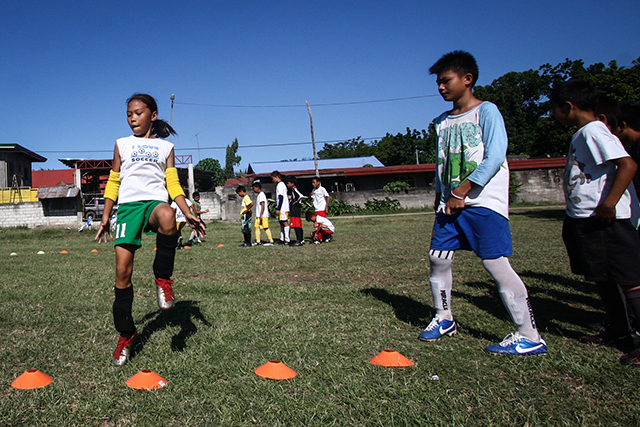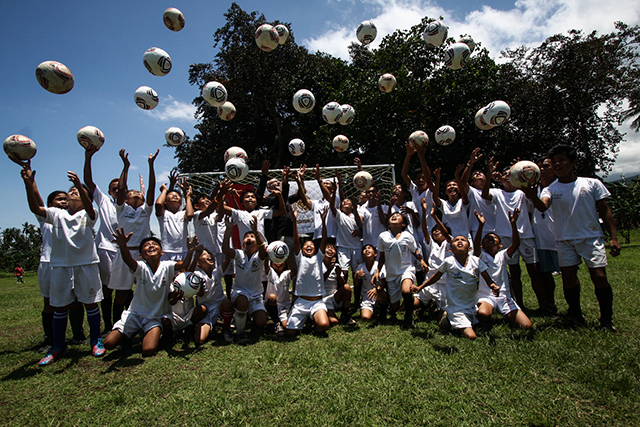STA. CRUZ, Davao del Sur (MindaNews / 27 April) — High school buddies Bonifacio Fuentes and Junrey Midagat were often seen running the streets of Digos City some eight years ago with knives, sticks and stones in their hands.
The streets served as refuge for these restless teenage members of a street gang called “God Against War” — and as battleground during gang wars.
Fuentes and Midagat used their legs to kick rival gang members before. Today, they are using them to kick ball and teach younger children to play.
 Kids perform warmup exercise during a football clinic in Hagonoy, Davao del Sur on Friday, 25 April. The football clinic is part of the Sports Social School of ANAKK-Sta Cruz, an NGO supported by Fundacion Realmadrid and Fundacion Mapfre. Mindanews Photo by Ruby Thursday More
Kids perform warmup exercise during a football clinic in Hagonoy, Davao del Sur on Friday, 25 April. The football clinic is part of the Sports Social School of ANAKK-Sta Cruz, an NGO supported by Fundacion Realmadrid and Fundacion Mapfre. Mindanews Photo by Ruby Thursday More
Both are now part of the Social Sports Program of Ang Nagkahiusang Kabatan-onan Alang sa Kalamboan (ANAKK) Sta.Cruz, a non-government organization which provides alternative learning systems, formal education and livelihood skills to around 300 children and youth now.
Fuentes, now 20, admits the influence of their barkada led them to joining a gang. “It’s so hard to avoid trouble or riots because (members of) the other side, sometimes, are the ones looking for trouble.”
He said riots sometimes happened outside the high school campus in Digos City.
Midagat recalls it was not easy to run away from riots. “Kantyawan man ka na talawan. Siyempre, matandog pud ang pride, mosukol ka na lang pud” (You will be ridiculed for being a coward if you run away. Since your pride is at stake, you’ll end up fighting).
Due to their involvement in the gang, they were not able to finish high school.
Interest in football
While in high school, Midagat and Fuentes were members of the Football varsity.
Fuentes recalls almost everyone in the squad was a gang member.
They played during the Davao Regional Athletic Association Meet and almost made it to the Palarong Pambansa “but we refused (to go to the Palaro) because only three of us will join the champion team to represent Davao Region.”
Their team – whose name then would depend on whoever was the sponsor — was one of the most formidable junior squads in the city, and had traveled to different places to compete.
The sponsors, however, shied away from them when their manager allegedly pocketed the funds.
Even without sponsors, however, they continued playing football. As they continued being active in the gang.
Pablo Tanuan, Anakk’s executive director, recalls how Fuentes and his squad played football with some of the teens under the program around 2007.
The gang members were coming to Sta. Cruz for tune-up games, he said.
“But since they were still active in their gang, their presence in the pitch and in our gathering was on and off as well. Nobody handled them as a team,” Tanuan recounted.
But late last year, Tanuan said they were formally absorbed in the program and the former gang members are now taking up non-formal education under the Alternative Learning School (ALS) of the Department of Education.
Not just football
Tanuan explained that Anakk’s program is not just about playing football. The game is merely an instrument to attract the marginalized children, out of school youth and the poor families to attend school.
“The kids here don’t just play football, they should either attend formal or non-formal schooling. These two are incorporated” he said.
In playing football, Tanuan added, the kids are diverting their energies to productive use.
As a game, football is also educational “because we also incorporate values formation, he said, adding that coaches also teach them hygiene, health and other literacy components during breaktime.
“To be an athlete is just secondary. The primary aim is to be a responsible citizen through our holistic programs. This is the reason why we give more focus on former gang members, ” Tanuan explained.
First Social Sports School
Anakk’s Social Sports School is the first in the country after football giant Realmadrid Foundation along with Mapfre Foundation, a Spanish insurance firm, supported the program three years ago.
 FROM SPAIN WITH LOVE Kids under the Social School Sports of ANAKK-Sta Cruz group celebrate after receiving 41 footballs from football giant Realmadrid Foundation and Fundacion Mapfre on Saturday, 26 April, in Sta Cruz, Davao del Sur. MindaNews Photo by Ruby Thursday More
FROM SPAIN WITH LOVE Kids under the Social School Sports of ANAKK-Sta Cruz group celebrate after receiving 41 footballs from football giant Realmadrid Foundation and Fundacion Mapfre on Saturday, 26 April, in Sta Cruz, Davao del Sur. MindaNews Photo by Ruby Thursday More
The Social Sports School is a program promoted by the Realmadrid Foundation in partnership with Mapfre Foundation, which does not simply introduce football as a game but as an educational tool in values formation, tendering formal and non-formal education and other social activities for personality developement.
Tanuan said a Spanish friend introduced him to the Realmadrid Foundation.
Last year, Anakk started to expand in Digos City, Hagonoy and Padada in Davao del Sur.
“The are some volunteers who are helping us run our school. We have several football coaches whom we pay on a per session basis since we cannot afford to pay them regularly,” Tanuan said.
In 2011, a coach from the Realmadrid Foundation arrived and trained coaches and some players.
Early this year, the foundation also trained another batch of coaches. The training did not only focus on the technical aspect of the game but also on its being an important source of motivation and values formation.
Among those who were trained were Fuentes and Midagat.
“Football is just a hook. Football is just something that attracts the community to enrol in the program that will help them,” said Javier Warleta, president of Mapfre Insurance, who came to deliver 41 footballs given by Realmadrid Foundation.
But there are a lot of programs, which is the most important, under the project that helps the youth and their families, Warleta added.
From streets to pitches
“In the past, we were out in the streets. Now we are in the pitches teaching children the game as well as sharing lessons from our past,” said Fuentes who is now studying to be a motorcycle mechanic under the ALS.
Midagat, who is pursuing a course to become a cellphone technician, also under ALS, being part of the Social Sports School is an opportunity to correct his wrongdoings.
“I realized how I feel safe and secure now after leaving the gang,” he said.
Tanuan said they were able to convince some of the rival gangs to be part of the Social Sports School.
“As of now, we already have at least 40 former gang members who are now playing football and studying under ALS.”
He added it was very challenging to convince gang members to focus on the program, especially in the urban area.
Recently, a livelihood program was launched for the out of school youth in Digos.
“If we don’t give more attention to these gang members, they will return to the streets. Some were not able to continue the program. But at least, we gave them an opportunity to transform,” said Tanauan. (Keith Bacongco/ MindaNews)
